- Home
- Mack Reynolds
Galactic Medal of Honor Page 3
Galactic Medal of Honor Read online
Page 3
“In actuality, from the first man’s explosion into space was basically a military and national prestige thing. We did a great deal of oratory about pure science and cooperation between the nations but even from the beginning spy satellites were sent up for military espionage purposes. Before long, first the United States and the Soviet Complex, and later the others, began to send up primitive military spacecraft armed with such weapons as could be designed for space combat at that time, largely missiles with nuclear warheads. Before very long, the early two or three man ships evolved into small cruisers with eight or so men aboard. Weapons became more sophisticated and we saw laser beam weapons, popularly called death rays, developed.
“We were at that stage, when the Kradens materialized. What they wanted well possibly never find out.”
“We know what they wanted,” Don protested.
Thor Bjornsen ignored him. “It was immediately assumed, the human mentality being the human mentality that they had come to conquer Earth. Why they would want to the Almighty Ultimate only knows. Perhaps they were an exploring expedition; perhaps they were a colonizing expedition looking for new worlds, which doesn’t mean, necessarily, that they would take over a suitable world by force, if it was already supporting an intelligent life form. It is to be assumed that if they had the technical ability to cross space, they would have a more sophisticated ethic than we possess. A culture does not progress technically without also progressing ethically. If it didn’t, it would probably blow itself up, as we almost did on Earth shortly after the discovery of such super-weapons as nuclear bombs.”
“Come on, come on,” Don protested. “I don’t need a lecture on ethics.”
“Very well. Each of the four Earth powers with space fleets had patrols out at all times. Of a sudden, they were no longer four space fleets but one. And as a man they thundered in on the strangers from space. I would assume that it took the extraterrestrials by shock. Suddenly they were under attack, and under attack by the equivalent of the Japanese kamikaze fighters of the Second World War. Perhaps the Kradens attempted to defend themselves, but we aren’t even sure of that. We don’t really know if they were armed, and some strange tales and rumors have drifted down to us.”
Don said indignantly, “Are you completely drivel-happy? They destroyed more than twenty of our spacecraft!”
The other looked at him thoughtfully. “I can’t prove it, but I’ve often wondered whether our spacecraft didn’t shoot each other down, or blow each other up, by mistake. Please remember that though they thought themselves fighting a common foe, they weren’t coordinated. They entered the fight as four different space forces. Many couldn’t even speak the languages of the other Earth craft involved. All was confusion, everyone shooting every which way. As we know, several, at least, of the extraterrestrials were destroyed. The rest disappeared from whence they came, it is to be supposed, in a burst of speed beyond our own ships.”
“All right,” Don said, “but you don’t bring into this fanciful story the fact that from time to time they come back.”
“I don’t believe it,” Thor said.
Don was glaring at him now. “Damn it,” he said, “you make less sense by the minute. They’re continually being spotted. Sometimes one at a time, sometimes a small group, sometimes a larger one. What do you think our Sector Scouts are out for, fun and games, or just the ride?”
“Remember the Flying Saucers?”
“I don’t know what you’re talking about.”
“Sometimes they called them UFOs, Unidentified Flying Objects. About the middle of the last century, a regular craze went through the United States, in particular. Hundreds and even thousands of UFOs were spotted. They were popularly assumed to be visitors from space. Some viewers went to the extreme of seeing them land and sometimes little green men, or whatever, would come out. In a few cases, crackpots would claim that they were taken aboard and flown off to Jupiter, or wherever, where, surprise, surprise, they spoke Earth languages. But to boil it down, no real proof was ever presented that these UFOs were from other worlds. They never did explain all of them, but there was never proof that they were extraterrestrial.”
Don said belligerently, “Do you mean that all these patrol reports our Space Scouts send in are hysteria, or just plain lying or mistakes?”
“Yes, that’s exactly what I’m saying.”
Don said, “Sometimes our spacecraft fire on these Kradens they spot.”
“Maybe they fire, and at what, I wouldn’t know. But I doubt if they’re firing at Kradens or any other extraterrestrials. I suspect it’s largely trigger-happy space pilots, at nerve’s end, or possibly touched with space cafard.”
Don had another protest. “You forget that some of our ships are missing. Totally missing.”
“I’m not at all surprised at accidents in space. Our ships aren’t that advanced as yet. The fact that a Space Scout disappears is no proof that a Kraden destroyed it.”
Don said, belligerently again, “That could happen on some occasions, but remember Vico Chu and Arch Windemere? They both reported spotting Kradens, and both reported going in to attack, and both were never seen again. We didn’t even find debris from their scouts.”
Thor said stubbornly, ” I have a theory that they spotted each other, took each other for Kradens, panicked, both fired and destroyed each other.”
“Almighty Ultimate,” Don said in disgust.
Thor said, “Where in the hell do we get such names as Kradens? We’ve never been in any kind of contact with them whatsoever.”
Don snorted. “The names just sort of materialized. Nobody seems to know who dreamed up the name Kraden for their species. But their fleet was photographed during that first action and their spaceships were different sizes, so the military gave them different names, just so they’d have some sort of label to work with.”
The big man said, “At any rate, we have no particular reason to think them belligerent. For all we know, maybe they didn’t want anything more than to trade.”
“Trade what?” Don said in rejection. “If they can cross interstellar space, they’re so far ahead of us that we couldn’t have anything they want.”
But the other shook his head. “Possibly they’ve run out of some of the more rare metals or other elements. If their civilization is far beyond our own, it’s probably much older. Even in our own economy, we’re running desperately short of some basic elements. For that matter, possibly they’re highly cultured, and fascinated with the art and artifacts of alien cultures. Possibly they would like to pick up such little items as Leonardo da Vinci’s, or whatever.”
“No,” Don said. “It’s out of the question. If there aren’t any Kradens coming through any more, and they weren’t even belligerent when they turned up half a century ago, it would have come out by now. A whole solar system isn’t so stupid as to fight bogeymen, who don’t exist, for fifty years.”
The big man looked at him thoughtfully and threw his biggest bombshell. He said, “Perhaps there are elements who profit by the false alarm.”
III
Don Mathers didn’t leave the big man’s apartment until afternoon. They’d had a huge breakfast, and by the time it was over Don had thoroughly recovered.
He asked the other guardedly about the doctor, who would provide you with a false illness that could result in your honorable discharge from the military, for free. Thor explained that he wasn’t alone in opposing the all-out efforts of Earth and its solar system colonies to gird for defense against the Kradens. To him it was madness that the human race was devoting every effort to prepare for fighting an enemy that didn’t exist.
“It reminds me of the race to the moon,” he said in disgust.
Don said, over his coffee, “How do you mean?”
“Back in the very early days of space travel. The United States got a slow start but then dramatically announced that they were going to beat the Russians to the moon by landing there before the decade was out. Billions o
f dollars were spent, many of them squandered due to haste. Millions of man hours of the best scientists and technicians the country could boast were tossed into the supposed race to the moon. As a result, sure enough, they got there first and before the decade was out. The only thing was, there was no race. The Russians had made no attempt to land men on Luna. They were devoting their efforts to less frenetic experiments in establishing space platforms and sending out probes to Venus and Mars, and spending a damn sight less money and effort in doing so.”
“Well,” Don said, “back to this doctor.”
“The doctor feels the same as I do. The whole thing’s a farce. He believes that any man who devotes his career to the Space Service, or anything else connected with supposed defense, is wasting his life. And he’s willing to help get anybody out who wants it. Are you interested?”
“Let me think about it,” Don said evasively.
How did he know he could trust this big, seemingly generous man? He hardly knew him and the situation was a dangerous one. Theoretically, the human race was at war. Deliberate desertion could be punished with a firing squad. Suppose the doctor changed his mind, sometime in the future, and reported him. Or suppose someone else informed on the doctor and he was arrested and psyched. He’d spill everything he knew, including Thor Bjornsen’s name and that of Don Mathers.
Don thanked the other again and offered to transfer some of his pseudo-dollar credits to him in payment. Thor Bjornsen laughingly refused and told him to think over the doctor’s proposition. The big man was between jobs and could usually be located at the apartment. The trouble with his finding another position was that he didn’t want anything even remotely connected with the war effort, and there were precious few jobs these days that weren’t either directly or indirectly so connected.
Don Mathers was at loose ends. He had gone through quite a few of his pseudo-dollars the night before and so was deprived of the wherewithal to spend his three weeks leave in the manner he ordinarily would have. Besides, he was still glum about the treatment he had received from Dian Keramikou and apprehensive about the commodore and the possibility that his commander would send him to the medicos.
So he made his way to Harry’s Nuevo Mexico Bar. At least he had credit there and could drink without drawing on his pseudo-dollar supply.
The bar, this early in the afternoon, was almost empty. Don spotted a fellow One Man Scout pilot on a stool and went over to join him. It was Eric Hansen, who held down a full lieutenant’s rank, in spite of the fact that he was still assigned to the tiny scouts.
Don said, “Cheers, Eric. What spins?” He took the stool next to the other.
“My head,” the other said gloomily. “Hi, Don. I just got in from a three week patrol and I’m hanging one on.”
Harry came down and Don ordered a beer.
He said to Eric, “Didn’t you spot a Kraden once?”
“Yeah. About a year ago. Big excitement. That’s how I got my promotion.”
“What happened?”
“Nothing happened. It was just for a couple of seconds. It looked like one of those Dorsi Class cruisers to me. Traveling like a bat out of hell. Then it disappeared.”
Don glanced at him from the side of his eyes. He said, “Eric, damn it, you sure you saw that Kraden?”
The other was mildly indignant. “Sure I’m sure. What the hell are you talking about?”
“How long were you out when you saw it?”
“I was just about to head in. The patrol was over.”
“Any space cafard at all?”
“Almighty Ultimate. Anybody’s got a touch of cafard after three or four weeks in space, all alone.”
Don finished his beer and made circular motions with a forefinger to request another from Harry, who came rambling down. Two strangers in civilian garb had entered and he had just waited upon them at one of the tables.
Don said to Eric, “Could it have been a hallucination?”
“What?”
“The Kraden.”
Eric finished his highball with a quick gesture of the practiced drinker. He was still mildly indignant, in fact, less so than previously. He said plaintively, “Of course it could have been hallucination. I only saw it for a few seconds. Hell, in my time, I’ve seen elves playing around in the cockpit after a couple of weeks in deep space. So have you, no doubt.”
“I usually see fairies,” Don said. “Real pretty ones, with gossamer pink wings.”
“You’re probably a latent homosexual,” Eric told him.
They sat there for a while. Eric got another drink. He said, “How long do you go on before you get the big jolt of space cafard and go completely tripe-ripe?”
“I don’t know,” Don said, knocking on the bar with his knuckles, though he knew damn well it wasn’t wood. “What do you mean the Kraden disappeared?”
“Just that. One second it was there. Then it was gone. The only thing I can figure is that Intelligence is right. The Kradens have some way of dropping into ultra-space, or qua-space, or hyper-space, or whatever gobbledygook name you want to call it, and take off faster than light.”
Don said, pulling at his drink, “Don’t be drivel-happy. Nothing can go as fast as light. That’s basic. You got that in training.”
“I didn’t say anything about traveling at the speed of light. I said traveling faster than light. The big double domes these days are working it over. How otherwise could the Kradens come from some, uh, other star system? Hell, even the closest ones, uh, Alpha Centauri A and B are 4.3 light years from here and we haven’t any reason to believe that’s where they came from. The next nearest is Epsilon Eridani and that’s almost eleven light years away. The Kradens have to have some way of traveling faster than light.”
The other was getting more drenched by the minute, Don realized, but he said, impatiently, “You can’t travel faster than the speed of light.”
“Balls. Einstein never said so.”
Don looked at him. “Where in the hell did you take your basic?”
“Einstein said you couldn’t travel at the speed of light. He didn’t say anything about traveling faster.”
“Chum-pal, you’ve really got a load on. I envy you. But how could you possibly travel faster than light, without at one point traveling at the same speed as light?”
Eric said glumly, obviously tiring of the subject, “How would I know? There must be some way of dodging through the crucial point.”
One of the two men who had entered and taken a table came up and said, “Are either of you gentlemen sub-lieutenant Donal Mathers?”
Don gave him the once over and said, “I am.”
The newcomer was well dressed. His face was on the pinched side and his hair was thinning, which was passingly strange since baldness had long since been cured. His lips were dark, almost bluish, and his eyes were faded and somehow evasive. He projected uncomfortableness.
The stranger said, “My name’s Cockney, Frank Cockney. I wonder if I could have a few words with you, Lieutenant, over at the table.” He made a gesture at the table where his companion sat.
Don instinctively didn’t like him. “Why?” he said.
Cockney regarded him patiently. “You’ll know that when we’ve had the few words, won’t you? One guarantee. You won’t lose any money.”
“I haven’t any to lose,” Don said. He looked over at the table the two strangers had taken. Harry’s bar didn’t usually have many customers who weren’t in Space Services uniform. The other sat there unperturbedly, an untouched drink before him. He was a larger man than this one, almost as large as Thor Bjornsen, but dark rather than light. His face was expressionless. For some reason, Don thought of both of them as the mobster types you saw in the old revival movie and TV shows that were all the thing these days and sent viewers into spasms of laughter.
Don said, “What the hell,” and came to his feet. He went over to the table, pulled out a chair and said, “What do you want?”
The smaller
of the two strangers resumed his own chair and said, “Can you prove you’re sub-lieutenant Donal Mathers?” His voice was polite enough.
“Of course I can prove it. I have my Space Service I.D. and I’ve got my Universal Credit Card.”
“May we see them, please?”
“What are you, police or something?” Don Mathers couldn’t figure it out, and he didn’t particularly like the looks of these two. Besides, he wanted to get back to his drink.
“No,” the big one said.
Frank Cockney said, “This is Bil Golenpaul “No, we’re not police.”
Don Mathers-shrugged, ran a thumbnail over his mustache in irritation, but shrugged again and brought out his identification.
Cockney looked at it briefly and said, “The boss wants to see you.”
Don put his papers back into his pocket and said, “Great. And who in the hell is the boss?” It came to him now that by the looks of these two, their emptiness of facial expression, they were the kind of men fated to be ordered around at the pleasure of those with wealth or brains, neither of which they had or would ever have.
“Maybe he’ll tell you when he sees you,” the other said, patiently and reasonably.
Don came back to his feet. He said, “Well, you can tell the boss”
The one named Golenpaul said, “Suggest you check your pseudo-dollars credit, Lieutenant.”
Don squinted at him. “Why?”
Neither of the two said anything.
In continued irritation with this whole damn thing, he brought forth his Universal Credit Card and put it in the table’s slot and dialed the International Data Banks.
He said, “What is my credit standing?”
The mechanical voice answered almost immediately, “5324 pseudo-dollars and 64 cents.”
Don Mathers stared at the screen. He had never had five thousand pseudo-dollars to his credit at one time in his whole life. He said finally, “When was the most recent credit deposited to my account? And how much was it?”
The screen said, “This morning. The amount was five thousand pseudo-dollars.”

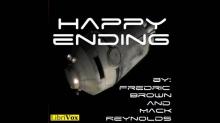 Happy Ending
Happy Ending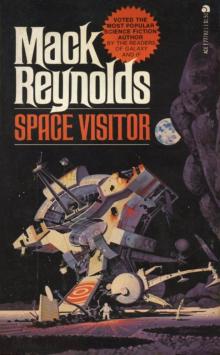 Space Visitor
Space Visitor A Kiss Before Loving
A Kiss Before Loving Episode on the Riviera
Episode on the Riviera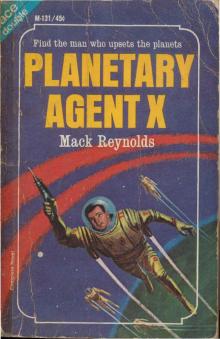 Planetary Agent X
Planetary Agent X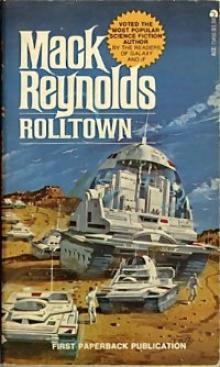 Rolltown bh-3
Rolltown bh-3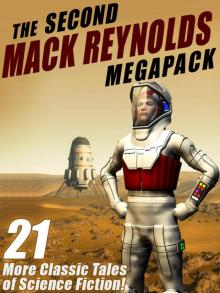 The Second Mack Reynolds Megapack
The Second Mack Reynolds Megapack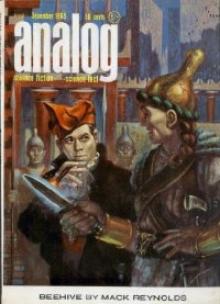 Dawnman Planet up-2
Dawnman Planet up-2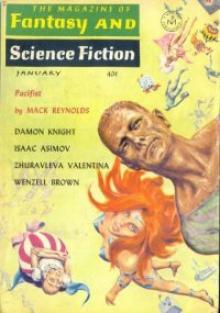 Pacifist
Pacifist The Other Time
The Other Time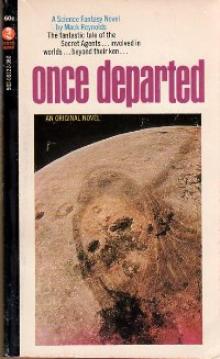 Once Departed
Once Departed IQ
IQ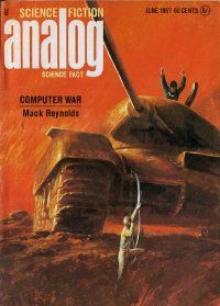 Computer War
Computer War Earth Unaware
Earth Unaware The Rival Rigelians up-3
The Rival Rigelians up-3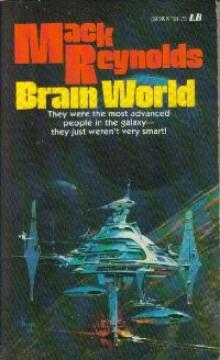 Brain World up-7
Brain World up-7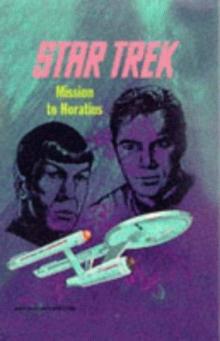 Star Trek - TOS - Mission to Horatius
Star Trek - TOS - Mission to Horatius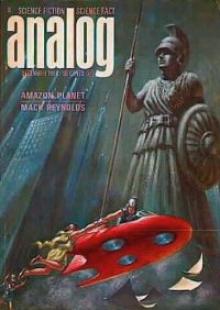 Amazon Planet up-5
Amazon Planet up-5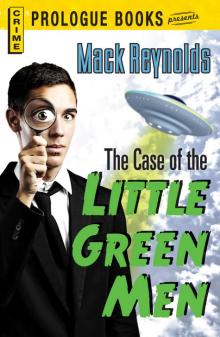 The Case of the Little Green Men
The Case of the Little Green Men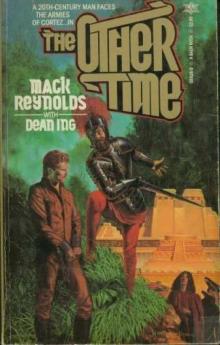 Other Time
Other Time The Mack Reynolds Megapack
The Mack Reynolds Megapack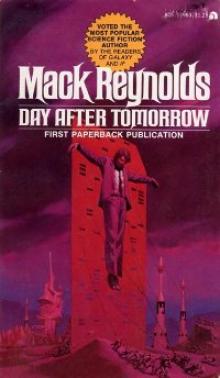 Day After Tomorrow
Day After Tomorrow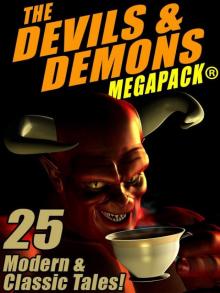 The Devils & Demons MEGAPACK ®: 25 Modern and Classic Tales
The Devils & Demons MEGAPACK ®: 25 Modern and Classic Tales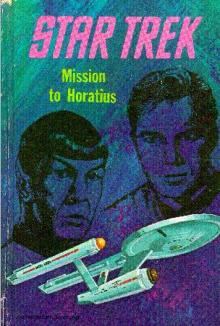 Mission to Horatius
Mission to Horatius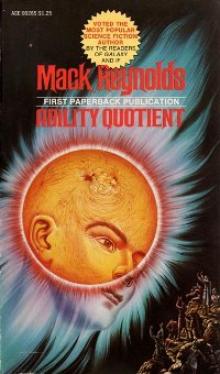 Ability Quotient
Ability Quotient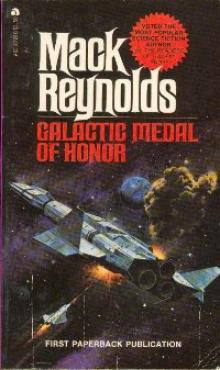 Galactic Medal of Honor
Galactic Medal of Honor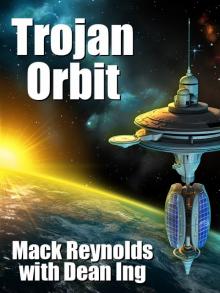 Trojan Orbit
Trojan Orbit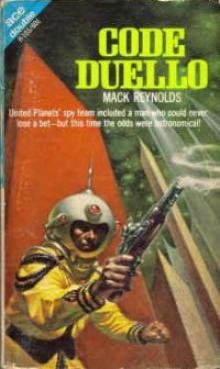 Code Duello up-4
Code Duello up-4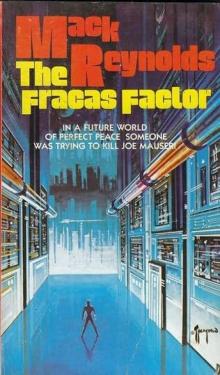 The Fracas Factor
The Fracas Factor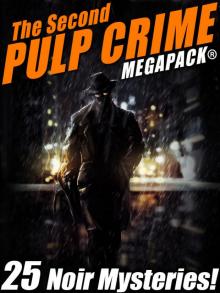 The Second Pulp Crime
The Second Pulp Crime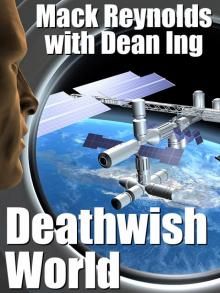 Deathwish World
Deathwish World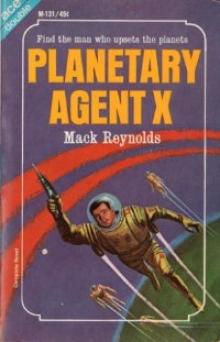 Planetary Agent X up-1
Planetary Agent X up-1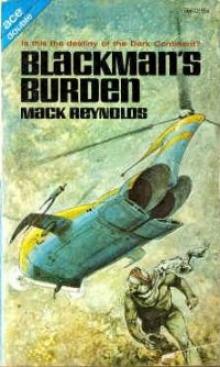 Blackman' Burden na-1
Blackman' Burden na-1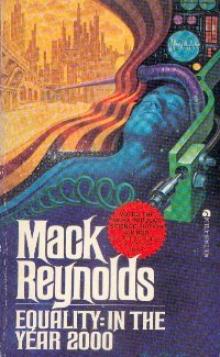 Equality: In the Year 2000 jw-2
Equality: In the Year 2000 jw-2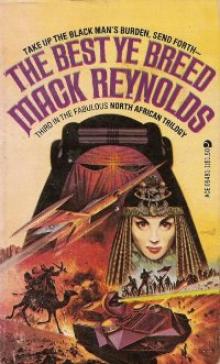 The Best Ye Breed na-3
The Best Ye Breed na-3 The Jet Set
The Jet Set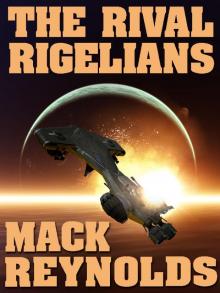 The Rival Rigelians
The Rival Rigelians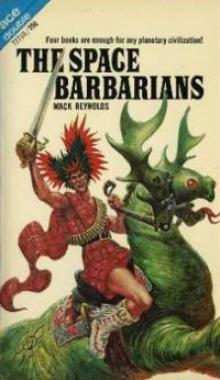 The Space Barbarians
The Space Barbarians